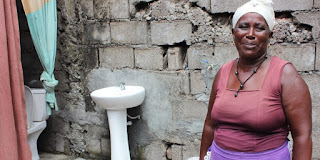Thanks to an MCC-funded project in Cabo Verde that provided
low-cost household connections to water and sanitation networks,
Celestina now has clean water coming directly to her home, and now
spends less time collecting water. As women and other vulnerable groups
gain a greater voice in decision-making and greater access to water and
sanitation services, they will be better positioned to pursue education
and employment opportunities that help them lift themselves out of
poverty. Photo: MCA-Cabo Verde II
June 16, 2017
Story: MCC website
Spotlight on Cabo Verde: Expanding Access to Water and Sanitation is Critical to Economic Growth
Women, the poor and other vulnerable groups are particularly impacted
by the shortcomings of the water and sanitation sector in developing
countries like Cabo Verde. Yet, women and the poor are seldom
represented in national policy conversations and decision-making. At the
local level, utilities rarely design services that address the
challenges that these groups face in accessing and paying for water and
sanitation. But in Cabo Verde, an island nation off the coast of West
Africa, this is changing.
In partnership with the Government of Cabo Verde, MCC is supporting
reforms to the country’s major water and sanitation institutions and the
development of a financially sound basis for the delivery of water and
sanitation services — from clean tap water to safe wastewater removal.
By considering women, the poor and other disadvantaged populations in
making these reforms, along with improving accountability, the
Government of Cabo Verde is expanding access to and affordability of
these vital services to help people lift themselves out of poverty.
Read more about MCC’s partnership with the Government of Cabo Verde in our blog post from Naomi Cassirer, MCC Gender and Social Inclusion Director, and Lona Stoll, MCC Deputy Vice President for Sector Operations.
Subscribe to:
Post Comments (Atom)

No comments:
Post a Comment